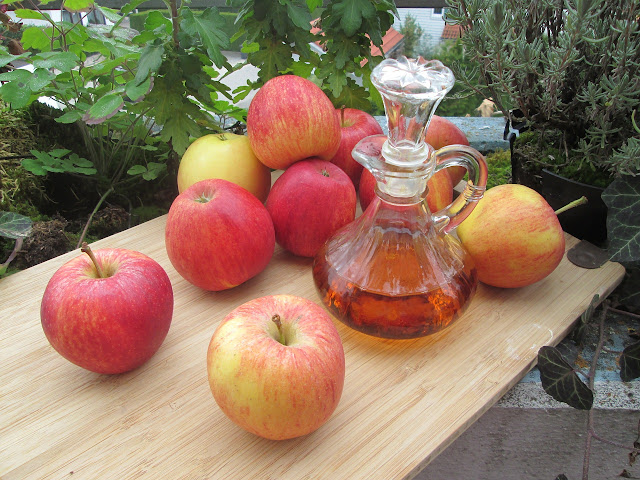6 Health Risks Of Apple Cider Vinegar
About Apple Cider Vinegar
Apple cider vinegar, or cider vinegar, is a vinegar made from fermented apple juice, and used in salad dressings, marinades, vinaigrettes, food preservatives, and chutneys. It is made by crushing apples, then squeezing out the juice. Bacteria and yeast are added to the liquid to start the alcoholic fermentation process, which converts the sugars to alcohol. In a second fermentation step, the alcohol is converted into vinegar by acetic acid-forming bacteria (Acetobacter species).Acetic acid and malic acid combine to give vinegar its sour taste. Apple cider vinegar has no medicinal or nutritional value. There is no high-quality clinical evidence that regular consumption of apple cider vinegar helps to maintain or lose body weight, or is effective to manage blood glucose and lipid levels.
Processing
Homemade
All apple components may be used for homemade apple cider vinegar fermentation. Cutting the apples into small cubes increases their surface area, aiding the fermentation. The apple pieces are submerged in a water and sugar (or honey) mixture to supply sugars for fermentation. Once the pieces are submerged, a breathable covering is placed for approximately 2 weeks, then strained, and stored another 4 weeks until vinegar is achieved.Commercial
Apples are brought onto a processing belt where they are crushed, pressed, and the juice separated.The material is most often stored in a submerged tank where the first fermentation process begins through which oxygen is supplied. To achieve alcoholic fermentation via the bacterial strain acetobacter, then the ethanol produced yields acetic acid and vinegar.The "mother" is an undefined microbial culture left in the vinegar prior to distilling and pasteurization.Although oral use of small quantities of apple cider vinegar is considered safe but over use can have following health issues :-
- Ingestion of apple cider vinegar in tablet form poses a risk of injury to soft tissues of the mouth throat, stomach, and kidneys
- Irritation and redness are common when the eyes come into contact with vinegar, and corneal injury can occur
- Using vinegar as a topical medication, ear cleaning solution, or eye wash, is hazardous.
- Due to its acidity, exposure of teeth from consuming undiluted apple cider vinegar may damage tooth enamel.
- Although small amounts of apple cider vinegar may be used as a food flavoring, it may be unsafe for use by pregnant and breastfeeding women and by children.
- Different commercial brands of apple cider vinegar were found to have inconsistent acid levels, with some contaminated by molds and yeast.
Adverse reactions
- People with allergies to apples may experience adverse reactions to apple cider vinegar.
- Topical use of apple cider vinegar to treat skin diseases may cause burns.
- The use of apple cider vinegar may cause interactions with prescription drugs, such as insulin or diuretics.
References:
https://books.google.com.pk/books?id=WB8PDQAAQBAJ&pg=PA59&redir_esc=y
https://www.mayoclinic.org/healthy-lifestyle/weight-loss/expert-answers/apple-cider-vinegar-for-weight-loss/faq-20058394
https://www.poison.org/articles/vinegar-164




Comments
Post a Comment